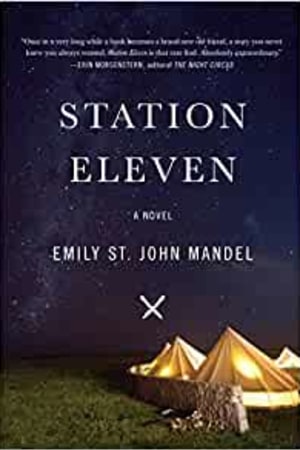Science Fiction
- Publisher : Thorndike Press; Large Print edition
- Published : 19 Nov 2014
- Pages : 557
- ISBN-10 : 1410474178
- ISBN-13 : 9781410474179
- Language : English
Station Eleven
The sudden death of a Hollywood actor during a production of "King Lear" marks the beginning of the world's dissolution in a story told at various past and future times from the perspectives of the actor and four of his associates.
Readers Top Reviews
J. HoltColetteJan
Long rambling narrative with a scattered plotline that doesnt deliver. The sample reads great if, like me, you love post apocalyptic novels but after that, this story goes nowhere over a very long time. I persevered to the end but it really was not worth it. It was well written but it's not a climactic page turner. If you appreciate good sci-fi then you will also find this is full of holes. Best post apocalyptic sci-fi I read recently is the Bobiverse series, which was recommended on a review here somewhere, try that instead.
M. DowdenJ. HoltC
As you can see there are a number of lower starred reviews on this site, and there is probably a good reason for this. It seems that people expected to read a post-apocalyptic novel, and that is it, but although of course although this story does fall into that category, there is a lot more to it, meaning that this is more of a genre crossing tale. We have the years after the singular event that causes the post-apocalyptic dystopia that we read of, but we also have before then and not only the events that led up to the massive flu pandemic, Georgia Flu here, but people who are in one way or another circling the actor, Arthur Leander. As we read this we see how important this character is, although he spectacularly dies on stage near the beginning of this, whilst playing King Lear. Of course, it is unlikely that a pandemic would kill so many people throughout the world in so quick a period, and there is missing some of the really hard-hitting pieces about life immediately after such an event, although rape and murder do come up in the story. This tale concentrates on other things, which makes it so interesting and giving us food for thought that is usually missed. We meet throughout this book then characters who are related to Leander, through marriage, and even his child, as well as friends of his, and those who for one reason or another have come into contact with him. This may not seem that important at the beginning of this, but it is as you read further into the tale. By flicking between the past and the present so Emily St John Mandel keeps us intently reading, as we see how all the different pieces come together. We read of Kirsten here then who is travelling with the Symphony, a company that puts on musical events and Shakespearean plays, and as we see, when they eventually reach a town on their usual circuit to pick up a couple of their members, so things have changed, with the so-called Prophet in charge, and his cult. Kirsten was a child actor, who was there when Leander died, and also who was given a couple of comics by him, which were created by his first wife. This is only one link we see between the past and present. This makes us think of the importance of art and culture on our lives, as well as the loss of those we know, and nostalgia for a past that no longer exists. Therefore memory plays a part here, and how civilisation plays an important part of our lives. By the latter years mentioned here, so life has sort of fallen into a routine, where some control and a touch of normality has started to seep into the everyday. This reminds us that although after some cataclysmic event life may change, eventually it will all fall back into a certain normality, and we can see this throughout history, with the plague, and other epidemics. Whilst people from before such an event are alive, so thin...
SyThe Middle Shel
You know a book is a slog when you'd rather do anything else other than reading it. I really wanted to like it, after so many great reviews, but the best part about it was finishing it, and moving on to another book. Station Eleven starts like any post-apocalyptic book, with the obligatory deadly flu that empties the earth. So far so good. But no, it keeps jumping back to the pre-flu world, following this insipid and unsufferable movie star and his interminable collection of wives (soon to be ex wives) and mistresses (soon to be wives, soon to be ex wives). At least gossip magazines make it juicy enough to keep us entertained. And if gossip was what I wanted to read, I would have bought the gossip magazines. There's also some very sparse parts set several years after the end of the world as we know it, with a group of travelling actors and musicians performing for the struggling human settlements along the road, which could also be interesting if it wasn't, again, mindless gossip about the performers, who sleeps with who, who likes who, the costume choices, where can we find a jar of rosin, etc. You'd think a post apocalyptic world would offer more interesting subject matters. The only tenuously secondary story that has something interesting to offer follows a group of survivors stranded at an airport, and a self proclaimed prophet with nefarious intents. But it all probably takes less than 10 pages in total.


